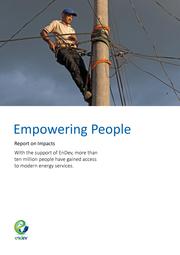EnDev Report on Impacts
Overview
With the support of EnDev, more than fifteen million people have gained access to modern energy services.
Empowering People
Four out of five people on this planet simply turn a switch. The lights come on, a computer powers up, hot water flows from a tap or machines start humming. One out of five, however, does not have a switch to turn, since he or she simply has no access to energy. There are various reasons why 1.3 billion people are sti ll without electricity and 2.6 billion rely on open fires and traditional stoves for cooking. Operati ng electricity grids in remote areas is not economically viable for many electricity suppliers in developing and emerging countries. Initiatives for disseminating modern stoves, in turn, face numerous social, cultural and economic challenges. Energising Development – EnDev – supports access to energy services for low-income populations, social institutions and small and medium sized enterprises in Africa, Asia and Latin America. EnDev achieves this by establishing economically sustainable energy solutions and distribution schemes, mainly in rural regions.
EnDev does not produce energy though – EnDev mainly boosts pro poor energy markets for example for solar lanterns or modern cookstoves. Moreover EnDev supports partner countries, government bodies and enterprises to extend grid connections, offer mini grid solutions and grid densification.
A market approach has the advantage that it supports the self-interest of the providers. They are off ering products and services independently. To earn a living they compete with each other and thus penetrate the markets quickly, reaching far more people than a development organization ever could. Once the markets are up and running, EnDev slowly withdraws and uses its experiences to initi ate markets in more countries.
EnDev has reached 15 million people in as little as ten years. This number is equal to the people living in Sweden or the entire population of the West-African country of Benin. It was not a straight-forward path. What worked in one country didn't work in another. Trying, failing, readjusting, and succeeding: As a learning programme, EnDev over the years has fine-tuned its methods and has gathered knowledge.
The goal of the United Nations global initiative Sustainable Energy for All to enable 1.3 billion people with electricity and to provide 2.6 billion people with access to modern cookstoves is not easy to reach. But it is possible. The technology and strategies exists – and yet the mission is not completed.[1]
Achieved Impact
Access to energy is a tool to improve livelihoods. The dissemination of modern energy devices can improve living conditions for people. Energy access figures are relatively easy to gather. It is much harder however to quantify and qualify impacts on productivity, poverty, health, gender, education as well as on environment & climate. EnDev has therefore commissioned a large number of studies. These studies prove the positive impact of the EnDev programme.[1]
- Reduced Poverty & Productive Use: In cooperation with its partners, EnDev has enabled 10.3 million people, 11,600 social institutions and 24,300 small and medium sized enterprises to gain access to energy. EnDev has also trained 30,000 stove builders, craftsmen, vendors, operators and technicians. Stove builders and solar companies alone achieved monthly revenues of over 8.2 million EUR in 2010 and 14.6 million EUR in 2012.
- Gender: Electricity and modern cookstoves facilitate the work of women and girls. Electric lighting improves living and working conditions at home, while modern stoves cook faster and cleaner, use less firewood and save up to 40 per cent of time that would be otherwise be spent searching for firewood. Women benefit from job creation, too, as shown by a study in Kenya, where women account for almost half of all modern stove builders, installers and marketers.
- Health: Modern stoves and lighting systems reduce emissions caused by traditional stoves or three-stone fires and by kerosene lamps and candles. The stoves promoted by EnDev on average emit 30 to 40 per cent less carbon monoxide and other pollutants such as nitrogen oxides, benzene or formaldehyde than the baseline stoves traditionally used. An EnDev study in Peru reveals that 70.5 per cent of tradit onal stove users complain about coughing attacks, whereas only 6.1 per cent of modern stove users do so.
- Education: To date, EnDev and its partners have supported 6,400 schools to gain access to modern energy services. It is expected that this will lead to better learning and higher success rates.
- Environment & Climate: Today, at a conservative estimate, more than 1.8 million stoves are improving the lives of 8.37 million people; almost two million people are benefitting from modern lighting. Every stove saves up to 0.59 tonnes of CO2 equivalent each year. This adds up to approximately 997,000 tonnes of CO2 per year. The wood and charcoal stoves promoted by EnDev save up to 973,000 tonnes of firewood each year which reduces degradation of forests. Although it cannot assume that this entire forest area will remain, it is clear - and has been confirmed by several studies - that the pressure on forests is lowered.
Download
Download EnDev Report on Impacts:
Further Information
- An older version of the Report on impacts is accessible here.
- Energising Development (EnDev)
References
- ↑ 1.0 1.1 EnDev Report on Impacts: https://energypedia.info/images/a/a9/Reports_on_Impacts_May_2013.pdffckLR Cite error: Invalid
<ref>tag; name "EnDev Report on Iompacts: https://energypedia.info/images/a/a9/Reports_on_Impacts_May_2013.pdf" defined multiple times with different content




















